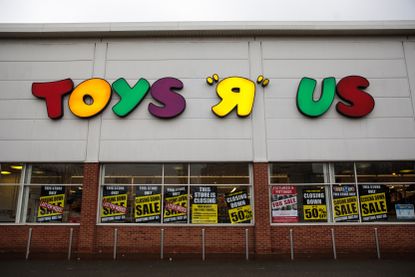How vulture capitalists ate Toys 'R' Us
Hope you enjoyed your leveraged buyout, guys — because 33,000 workers sure didn't


Just a few years ago, Toys 'R' Us was an iconic American retailer. Six months ago, it filed for bankruptcy. Two days ago, it announced that all 800 of its American stores, and all 100 of its British ones, are closing or being sold. As many as 33,000 workers could lose their jobs.
What happened to America's biggest toy store?
Simply put, vulture capitalists ate it.
Subscribe to The Week
Escape your echo chamber. Get the facts behind the news, plus analysis from multiple perspectives.

Sign up for The Week's Free Newsletters
From our morning news briefing to a weekly Good News Newsletter, get the best of The Week delivered directly to your inbox.
From our morning news briefing to a weekly Good News Newsletter, get the best of The Week delivered directly to your inbox.
Our story begins in 2004. After big success in the 1980s, Toys 'R' Us' performance turned lackluster in the 1990s. Sales were flat and profits shrank. Toys 'R' Us was a public company at the time, and the board of directors decided to put it up for sale. The buyers were a real estate investment firm called Vornado, and two private equity firms named KKR and Bain Capital. (You may remember the latter from 2012 campaign ads: It was co-founded by former Republican presidential candidate Mitt Romney, though he'd moved on well before this.)
The trio put up $6.6 billion to pay off Toys 'R' Us' shareholders. But it was a leveraged buyout: Only 20 percent came out out of the buyers' pockets. The other 80 percent was borrowed. Once Toys 'R' Us was acquired, it became responsible for paying off that massive debt burden, while also paying Bain Capital and the other two firms exorbitant advisory and management fees.
In theory, everyone wins in a leveraged buyout. It's supposed to take an ailing company private and retool it into a leaner and more effective business. Then it's sold back to public shareholders for a profit. The buyers make money; the shareholders get a healthier business; the workers stay employed.
What actually happened was Toys 'R' Us continued to stagnate. The company never really figured out how to respond to the changing market, or the rise of online retail. And it missed out on some opportunities, like licensing the Star Wars and Lego movie brands. Meanwhile, rising inequality and wage stagnation ate away at the broadly distributed middle-class consumer base that Toys 'R' Us and other retailers traditionally relied upon.
Whatever magic Bain, KKR, and Vornado were supposed to work never materialized. From the purchase in 2004 through 2016, the company's sales never rose much above $11 billion. They actually fell from $13.5 billion in 2013 back to $11.5 billion in 2017.
On its own, that shouldn't have been catastrophic. The problem was the massive financial albatross the leveraged buyout left around Toys 'R' Us' neck. Just before the buyout, the company had $2.2 billion in cash and cash-equivalents. By 2017, its stockpile had shriveled to $301 million, even as its debt burden ballooned from $2.3 billion to $5.2 billion. Meanwhile, Toys 'R' Us was paying $425 million to $517 million in interest every year.
This enormous cash drain probably made it impossible for the company to invest or innovate even if its trio of buyers had been up to the challenge. It also made it impossible to sustainably turn a profit. Toys 'R' Us consistently saw net losses from 2014 to 2017. But in the last three years, those net losses were considerably smaller than its debt payments. In fact, the losses were shrinking amidst a general boom in toy industry sales; by 2017, its losses were all the way down to $36 million.
In other words, if Bain, KKR, and Vornado had never come along, Toys 'R' Us wouldn't be doing stellar, but it probably could've muddled through. As recently as last year, the company still accounted for 20 percent of all U.S. toy sales.
Instead, the legacy of the leveraged buyout turned this into an existential crisis, and Toys 'R' Us filed for bankruptcy midway through last year. Then, when holiday sales didn't pan out, the company's leadership decided to sell or shutter all its stores. And 33,000 working people could lose their jobs.
Bain, KKR, and Vornado will have to write off their investment, of course. But they did suck around $200 million in fees out of Toys 'R' Us over the course of their ownership.
Basically, the trio took an imperfect-but-functioning company and cannibalized it for cash.
Frustratingly, the story of Toys 'R' Us' debt burden has been a footnote in news coverage, buried under musings on how the company failed to compete with the likes of Amazon. And when the debt is covered, it's often devoid of context: Toys 'R' Us just happened to borrow money, it proved to be a bad decision, and now the retailer is suffering the fate of imprudent borrowers everywhere. Rarely does anyone point out that debt was a deliberate Wall Street strategy.
Nor was it an isolated strategy. As David Dayen has diligently chronicled, these sorts of leveraged buyouts are dragging down retailers across the industry. In fact, we can widen our gaze further to the entire economy: In a remarkable turn, corporate payouts to shareholders and stock buybacks recently started to collectively exceed corporate profits. And the gap is made up by borrowing.
In short, how Bain, KKR, and Vornado treated Toys 'R' Us is how Wall Street treats American businesses writ large. And if inequality is dragging down the profits of retailers and other industries, then these cannibalistic practices are the other half of the feedback loop: driving inequality ever higher, and depriving Americans of the jobs and incomes they need to consume.
In other words, we are all Toys 'R' Us. And the vultures are hungry.
Create an account with the same email registered to your subscription to unlock access.
Sign up for Today's Best Articles in your inbox
A free daily email with the biggest news stories of the day – and the best features from TheWeek.com
Jeff Spross was the economics and business correspondent at TheWeek.com. He was previously a reporter at ThinkProgress.
-
Why is Tesla stumbling?
In the Spotlight More competition, confusion about the future and a giant pay package for Elon Musk
By Joel Mathis, The Week US Published
-
 How Taylor Swift changed copyright negotiations in music
How Taylor Swift changed copyright negotiations in musicunder the radar The success of Taylor's Version rerecordings has put new pressure on record labels
By Theara Coleman, The Week US Published
-
 Job scams are increasingly common. Here's what to look out for.
Job scams are increasingly common. Here's what to look out for.The Explainer You should never pay for an application or give out your personal info before being hired
By Becca Stanek, The Week US Published